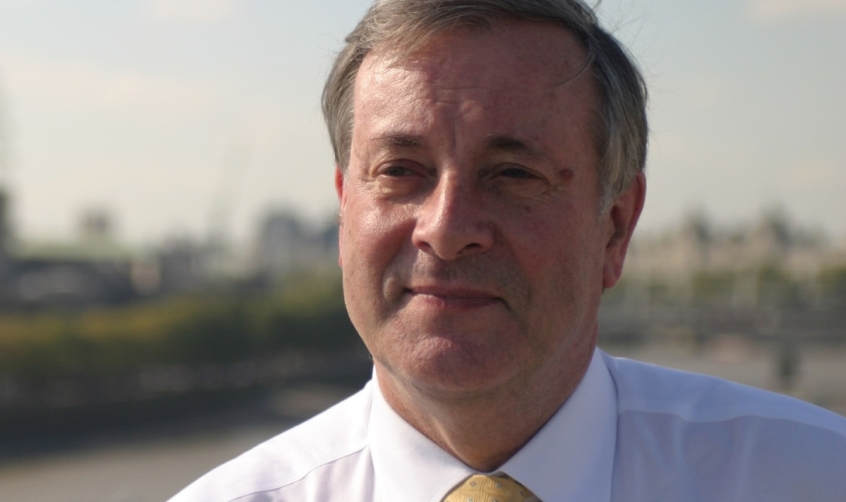
Leading theologian Alister McGrath describes how he returned to Christianity from the 'distant country' of Marxism and scientific atheism in his latest book, Return from a Distant Country.
The book is published in the new My Theology series from Darton, Longman & Todd in which well-known theologians write about the personal and intellectual influences that have shaped their work.
Born in Belfast in 1953 and baptised into the Anglican Church of Ireland, Professor McGrath studied chemistry at Oxford University in the 1970s before switching to theology.
He is now the Andreas Idreos Professor of Science and Religion at Oxford and his bestselling books include The Dawkins Delusion?: Atheist Fundamentalism and the Denial of the Divine, in which he challenged The God Delusion, by atheist biologist Richard Dawkins.
Christian Today spoke to Professor McGrath about his new book and the central importance of good theology for the life and witness of the Church.
CT: You begin your book with this declaration: "I never expected to be a Christian theologian, mainly because I never expected to be a Christian." What was the main thing that drew you to Christianity at Oxford in the 1970s?
AM: I was an atheist when I arrived at Oxford, although I had some growing doubts about whether atheism was really as simple and rational as I had thought. My doubts increased as it became clear that my atheist friends at Oxford couldn't prove that their beliefs were right. I gradually came to see that atheism was a matter of faith, not something that could be proved.
These friends believed that there was no God, but could not show that this was right. I had been attracted to atheism as a teenager because of its apparent certainty, and I now began to realize that it was actually a faith. As I met and talked to lots of students and academics who were Christians, I began to realize that I had misunderstood what Christianity was all about.

One of the reasons for my teenage atheism was that I believed that God was a total irrelevance. God was in heaven; but I was on earth, in the midst of time and space. God had no connection with or presence within my world, and could say or do nothing of any relevance to me.
But my Christian friends at Oxford told me about the Christian doctrine of the incarnation. I could see that, if this was right, it was a game-changer.
God was not a distant irrelevance, but someone who chose to enter into my world of space and time in Christ. "The word became flesh and dwelled among us" (John 1:14). Suddenly, I realized why Christians put Christ at the heart of their faith.
If we are asked what God is like, we can point to Christ, who shows us God's nature and face. We can see the face, not merely know the character, of our God. God is like Christ, who is the "image of the invisible God" (Colossians 1:15).
CT: You write: "For me, theology is a reflective inhabitation of the Christian faith, rooted primarily in the Bible and the long tradition of faithful engagement with this text, and the practice of worship and prayer." Some modern theologians seem to put themselves above the Lord's revealed truth in the Bible. How have you sought to avoid this in your ministry as a Christian theologian?
AM: For me, the Bible is the starting point for theology, and for the life of faith. I read the Bible in the company of Christians down the ages who pass on their wisdom to us in their writings, helping us to understand the Bible, and make connections with the way we think and live.
Theology is all about humility. It's about "unlearning" ideas about God that we pick up from our culture, and allowing the biblical idea of God to shape our lives and thought. That's why the public reading of the Bible in Christian worship services is so important. It reminds us that we don't make up our ideas about God or Christ. We learn these through reading the Bible, and then try to bring our lives and thought into line with what we find there.
For me, theology is about unpacking the riches of Scripture, and putting together the "Big Picture" that lies at its heart. It's not just about focussing on individual verses. It's about seeing these as threads that we can weave together to let us see this Big Picture.
It's certainly true that some theologians don't pay enough attention to the Bible. But anyone who studies the history of Christian theology soon realizes how central the Bible was to earlier generations of Christian theologians, especially in the first few centuries of faith.
One of the most common forms of theological writing at this time was biblical commentaries, in which theologians developed their ideas in close and constant dialogue with the Bible. That's what I try to do.
It's about intellectual humility, in which I have to set aside my ideas about what God ought to be like, and learn what God is like – and that means being deeply attentive to the biblical witness.
CT: What is your answer to Christian people who say: "I find theology boring. It's the lived experience of my Christian faith that excites me"?
AM: I completely understand this concern. Over the years, many ordinary Christians told me how they have been put off theology by what they describe as its "weird vocabulary", its "intellectual introversion", and its "disconnection from the life of faith". I know exactly what they mean.
Theology often uses language which bears little relation to everyday life, and seems far removed from that of the New Testament. Some kinds of theology seem to be about name-checking obscure people in discussing even more obscure questions. But it doesn't have to be like this.
At its best, theology aims to set out the compelling vision of God and life that lies at the heart of our faith. It helps sustain our worship, inform our evangelism, and deepen our personal faith.
It should excite us, making us yearn to go deeper into our faith, find out more about it, and how we can communicate this to the wider world. That's what we find in the writings of early theologians, such as Athanasius and Augustine.
I fully understand why many Christian laity and clergy are suspicious of academic theology, which so often seems detached from everyday concerns. That's why it is so important to realize that most Christian theologians are passionately committed to the wellbeing of their churches and communities of faith.
Throughout its long history, Christian theology has mostly been developed by reflective practitioners – by bishops and pastors, anxious to educate their congregations and help them grow in their faith, and by monastic writers concerned to develop an authentic life of Christian prayer and spirituality.
There is much to be learned from them. They are fellow travellers on the road of faith, and can offer us both guidance and encouragement as we journey.
CT: In your book you talk about how you often wondered during the 1970s how you might hold the natural sciences and the Christian faith together. What do you say to people who claim that Christianity and science are incompatible?
AM: That's a great question. I used to be a scientist at Oxford before I changed direction, and became a theologian. When I was a teenage atheist, I believed that science and faith were incompatible. But I don't think this anymore.
I would begin by pointing out that Christianity and the natural sciences are different – but that doesn't mean they are incompatible. After all, science and ethics are completely different ways of thinking, but that doesn't mean that scientists can't take ethics seriously, and try to live good lives!
Albert Einstein, perhaps the most celebrated scientist of the twentieth century, held together his science, religion, and ethics, seeing these as engaging different aspects of his life. They were all necessary in allowing him to understand our world, and live meaningfully within it.
Science is great in helping us to understand how our world functions. Christianity focuses on the meaning of life, and how we live a good life. Both of these are important, but they are different. They're like two different lenses.
The real problem begins when a scientist or a theologian tell us that they know everything that matters, and we don't need to know anything else. I find the philosopher Mary Midgley really helpful here. She explains that we need different toolboxes to make sense of our complicated world, and that none of these toolboxes can answer all our questions. We need to use these different toolboxes, and find a way of bringing their insights together.
If we limit ourselves to just one toolbox – say, science – we end up with a really restricted and inadequate vision of life. Science helps us understand how we, as human beings, function – and that's important medically.
Yet theology helps us understand our deeper needs – and that's important spiritually, as we learn how to "to glorify God and to enjoy him forever" (Shorter Westminster Catechism).
CT: History shows that Christianity can disappear from nations and indeed wider regions, or at least disappear from public view. Are you optimistic or pessimistic about the future for Christianity in the UK and, whichever way, why?
AM: I think the response of churches to the Covid crisis has been very revealing. My perception is that denominational leaderships have not been much in evidence during this difficult period. We heard little from them about the relevance of faith for coping with this crisis.
However, individual churches and congregations have often been highly effective in relating to their communities, maintaining pastoral relationships, and engaging with the wider culture.
I do worry about the tendency of church leaderships to over-invest in untested managerial strategies for church growth, as if planting new churches solves anything on its own.
Theology is about identifying what is so exciting and attractive about the gospel, how this can be put into words that can connect with our culture, and how faith is sustained and enriched through worship and preaching. It's that vision that draws people to faith.
If we lose this vision of a loving and transformative God that stands at the heart of our faith, we haven't anything much to offer to the world. That's what has happened to the Episcopal Church in the United States, which statistics published this month show is in sharp decline.
It may well be inclusive and welcoming – but its critics suggest it has lost sight of the central themes of the Christian faith, and is now little more than an empty shell, relying on the continued habit of churchgoing on the part of its ageing congregations for its survival.
But I am cautiously optimistic, because I know so many inspirational Christian preachers and pastors who can see how to connect the gospel with our culture, and who are excited about where this vision of a gracious God who can work in and through people like us will lead them.
In my view, preaching is theology on fire, capable of capturing a vision of this wonderful God, and showing how it changes lives and creates meaning. We need those themes to be heard in these difficult times.













